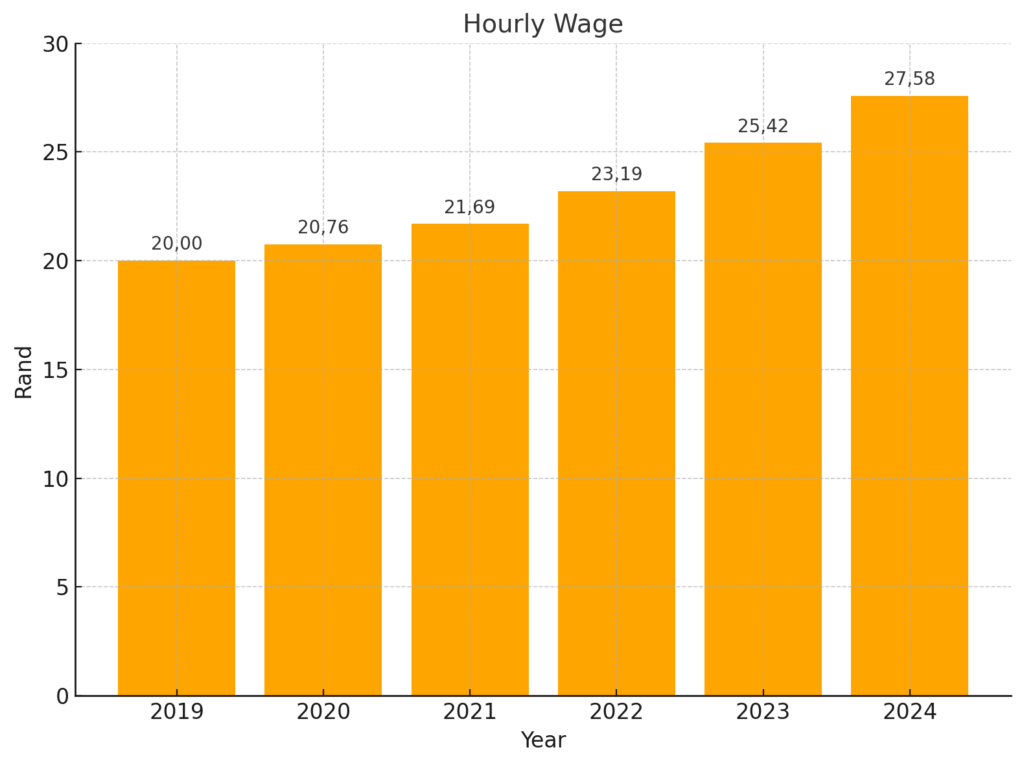
The National Minimum Wage Commission has proposed a substantial increase to the national minimum wage (NMW) for 2025. The recommended adjustment, outlined in a statement by the Department of Employment and Labour, suggests raising the wage by the Consumer Price Index (CPI) plus an additional 1.5%. This move, aimed at addressing economic disparities and bolstering the living standards of workers, is part of a broader effort to recalibrate wages in line with inflation and economic realities.
Key Takeaways
- Proposed Adjustment Formula: The National Minimum Wage Commission has recommended a 2025 increase for the national minimum wage, based on the Consumer Price Index (CPI) plus an additional 1.5%, with the final CPI figure to be determined six weeks prior to the 1st of March 2025.
- Public Consultation: The commission has invited written submissions from the public, with a deadline of 14 January 2025. This follows a report published in the government gazette detailing the commission’s recommendations and emphasising transparency and inclusivity in the decision-making process.
- Broader Economic Considerations: Factors such as inflation, cost of living, GDP performance, and the sustainability of businesses, especially small and new enterprises, are taken into account when determining the NMW adjustment.
Call for Public Participation
As part of the process, the commission has issued a call for public engagement, inviting written submissions on potential adjustments to South Africa’s NMW for 2025. The commission believes this inclusive approach will capture diverse opinions, ensuring that the proposed increase reflects both worker needs and employer capacities. This initiative underscores the government’s commitment to transparency and dialogue in shaping wage policies, particularly in a challenging economic climate.
The National Minimum Wage Commission released an in-depth publication in the government gazette on 18 December 2024. This document not only outlined the recommendations for the annual review of the NMW but also extended an invitation for public input, with a deadline for submissions set for 14 January 2025. The report further contextualises the commission’s decision-making process, offering insights into the economic trends, labour market challenges, and social conditions driving the proposal.
The Department of Employment and Labour highlighted that the CPI is pivotal in determining wage adjustments. For November 2024, CPI stood at 2.9%, reflecting a marginal increase from the 2.8% recorded the previous month. Given the persistent rise in living costs, the proposed adjustment aims to ensure workers maintain purchasing power amidst fluctuating economic conditions.
Planning your financial independence often begins with evaluating your living costs and setting realistic retirement goals. This guide breaks down the essentials to determine how much you need to stop working.

Timeline for Implementation
The adjusted minimum wage will come into effect on 1 March 2025. To finalise the rate, the CPI figure for December 2024—published in January 2025—will serve as the benchmark. This timeline is designed to provide businesses and workers sufficient clarity and preparation time, underscoring the importance of planning in wage policy adjustments.
The commission operates under the framework of the National Minimum Wage Act (NMWA), Act No. 9 of 2018, which mandates it to review and recommend annual adjustments to the NMW. The body comprises representatives from organised labour, business sectors, community groups, and labour market experts. This composition ensures a balanced perspective in wage-setting decisions, blending expertise with on-the-ground realities.
Broader Mandate and Annual Reporting
Beyond wage recommendations, the commission conducts annual investigations into the NMW’s impact on the economy, collective bargaining, and income equality. These findings, made available to the public, aim to enhance understanding and accountability. The commission’s analysis often shapes broader economic discussions, making it a key player in labour policy development.
Knowing when and how to ask for a raise can significantly impact your career and financial trajectory. This guide empowers employees with effective negotiation tips for earning what they deserve.
Overview of the Current Minimum Wage

As of 2024, the NMW is set at R27.58 per hour, applicable to most workers, including those in farming and domestic service sectors. Meanwhile, individuals employed under the Expanded Public Works Programme (EPWP) have a minimum wage of R15.16 per hour. This dual structure reflects the complexities of wage-setting in a diverse economy and highlights the need for tailored policies across various sectors.
Key Considerations for Wage Adjustments
The commission considers a comprehensive array of factors in recommending wage adjustments, including:
- Inflation and cost of living
- The need to preserve the purchasing power of the minimum wage
- Wage levels and collective bargaining outcomes
- Gross Domestic Product (GDP) trends
- Employers’ ability to sustain operations
- The impact on small, medium, and micro-enterprises (SMMEs) and new businesses
- Effects on job creation and unemployment
These criteria reflect the delicate balance required to uplift worker earnings while sustaining economic growth and employment.
Public Submissions and Their Importance
The public is urged to submit representations to the Directorate of Employment Standards at the Department of Employment and Labour via Private Bag X117, Pretoria, 0001, or email nmwreview@labour.gov.za. Such inputs are crucial in ensuring that the final decision aligns with the needs of South African workers and employers, fostering a more inclusive and equitable labour market.
The finalised rate will be announced in February 2025 by the Minister of Employment and Labour, marking a key milestone in the government’s efforts to tackle inequality and promote economic fairness. This announcement is expected to spark significant public interest, as it will set the tone for wages across the country in the coming year.
With the unemployment rate declining, policymakers are now shifting focus toward ensuring fair wages for workers. A proposed wage hike could impact both employees and employers in key industries. To understand how the broader job market is evolving, check out South Africa’s Unemployment Rate Drops to Lowest in Over a Year as Key Sectors Strengthen.
Conclusion
The National Minimum Wage Commission’s proposal for 2025 highlights its commitment to ensuring that the minimum wage remains fair and reflective of economic conditions. By incorporating public input and analysing key economic indicators, the commission aims to balance the needs of workers, employers, and the broader economy. The adjusted wage, set to be implemented from March 2025, underscores the government’s efforts to uphold legal wage thresholds and support workers’ livelihoods amidst evolving economic challenges.
Fast, uncomplicated, and trustworthy loan comparisons
At Arcadia Finance, you can compare loan offers from multiple lenders with no obligation and free of charge. Get a clear overview of your options and choose the best deal for you.
Fill out our form today to easily compare interest rates from 19 banks and find the right loan for you.



